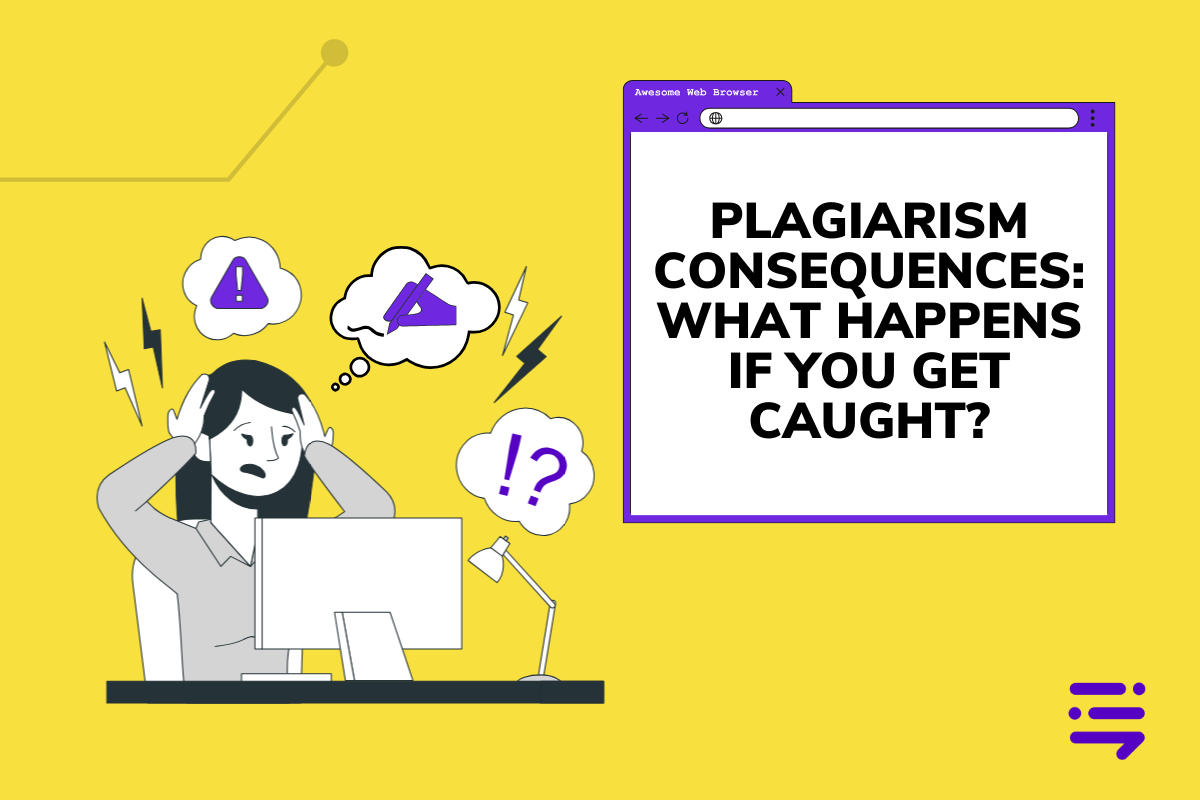Discover top guides, trends, tips and expertise from AIO Writers
Plagiarism Consequences: What Happens If You Get Caught?
Julia McCoy
Tuesday, 18th Jun 2024
What happens if you get caught plagiarizing someone else’s work?
What many students and writers don’t realize is that plagiarism consequences are far-reaching and can have a lasting impact, affecting their academic and professional future.
In this article, we’ll explore the implications of plagiarism and how to uphold academic and professional integrity in your writing.
Table Of Contents:
- Why Plagiarism Matters
- Plagiarism Consequences in Education
- Long-Term Implications of Plagiarism
- Plagiarism Scandals in Higher Education
- Beyond Academia: Plagiarism In The Professional World
- Avoid Plagiarism By Cultivating a Culture of Integrity
- Plagiarism in a Technology-Driven World
- FAQs: Plagiarism Consequences
- Conclusion
Why Plagiarism Matters
Let’s be clear — plagiarism is a serious academic offense.
At its core, plagiarism is presenting someone else’s ideas, words, or work as your own without giving them proper credit.
This can include copying and pasting from websites, paraphrasing without attribution, and even self-plagiarism where you submit your previous work.
Plagiarism Consequences in Education
Plagiarism carries significant consequences in academic institutions, impacting a student’s academic journey and future career prospects.
Here are some of the consequences for students and researchers who get embroiled in plagiarism issues:
Failing Grade
In most cases, plagiarism allegations can result in a failing grade on the assignment. The severity might vary depending on the institution’s policies and the extent of plagiarism, but it can range from a point deduction to a zero on the entire work.
Suspension or Expulsion
In severe cases of plagiarism or for repeat offenders, consequences can include suspension or even expulsion from the institution. These serious actions may affect a student’s academic record.
Long-Term Implications of Plagiarism
The damage plagiarism does to one’s reputation goes beyond immediate academic consequences and can impact a student’s life. It’s a serious issue with potentially significant impacts. It is never a risk worth taking because it can derail your academic and professional journey.
Damaged Reputation
Students caught committing plagiarism can suffer a blow to their academic reputation and credibility, making it difficult to gain admission into other academic programs. The ripple effects of plagiarism, particularly for someone starting an academic career can result in significant, lasting repercussions.
Limited Career Prospects
In the professional realm, plagiarism can hinder career opportunities, making it challenging to secure jobs or gain recognition.
Employers highly value integrity and originality. A history of plagiarism can tarnish your reputation, making it difficult to find job opportunities and advance in your chosen field.
Take the case of New York Times journalist Jayson Blair who was found to have committed extensive plagiarism and fabrication, resulting in his resignation and damaging his professional credibility.
“Plagiarism is one of the great academic sins. It has the power to destroy a scholar or writer and turn a lifetime’s work to dust.” — Australian writer Miranda Devine
Plagiarism Scandals in Higher Education
Educational institutions have very strict guidelines when it comes to academic integrity.
In 2019, a scientist had to leave Swinburne University after 30 of his studies were found to be copies of the same research, republished as many as 70 times. In an encrypted email sent to ABC, the whistleblower alleged that Dr. Ali Nazari published papers that “appear to combine falsification of results, plagiarism, duplicate publication and ghost authorship.”
Back in May 2012, the academic integrity of 125 Harvard University students came under scrutiny when a faculty member found suspicious similarities among several final exams for Government 1310: Introduction to Congress. The investigation by Harvard’s Administrative Board continued until December and by February 2013, over 70% of the students involved in the scandal were forced to leave the university.
In 2011, Amanda Serpico, a graduate student at Rutgers University, was accused of plagiarism in her final paper on gay marriage laws, which sparked a full-blown investigation. The detection software, Turnitin, reported that parts of her paper were lifted from other sources and not properly cited in-text although they were attributed in the reference section. As a result, Serpico received an “F” grade on the paper and the course.
Beyond Academia: Plagiarism In The Professional World
Plagiarism is just as unacceptable outside of school. Whether you are a seasoned professional or a recent graduate entering the workforce, these plagiarism consequences can be detrimental to your career.
Job Loss
If an employer discovers that you have plagiarized content or ideas, it’s grounds for immediate termination. Imagine investing your time and effort into building a successful career only to have it derailed by something as preventable as plagiarism.
Just ask this USC oncologist whose book was recalled after the Los Angeles Times found 95 instances of plagiarism.
The important takeaway here is that your career and professional reputation are on the line. Don’t let something like plagiarized work ruin your hard work.
Legal Consequences
Beyond the loss of income, there can also be serious legal repercussions depending on the severity of the plagiarism and the context in which it occurs.
Copyright laws are in place to protect original works. That means that those who engage in plagiarism and commit copyright infringement might face fines, lawsuits, or even criminal charges.
It can damage not only your reputation but also lead to serious penalties. It’s crucial to remember to prioritize creating original content for long-term success.
Reputational Damage
In the interconnected digital landscape, news travels fast. Instances of plagiarism can spread quickly, harming your online reputation.
This scenario makes it harder to find future jobs or secure clients. You’ll find a concrete example of this scenario happening time and time again in politics.
In one such case, Germany’s education minister resigned after being stripped of her doctorate because of plagiarism, further emphasizing that plagiarism can have far-reaching consequences in any profession.
Avoid Plagiarism By Cultivating a Culture of Integrity
You might think “It won’t happen to me,” but accidental plagiarism happens much more than you think.
Ignorance isn’t an excuse when the stakes are so high.
To maintain your academic integrity and avoid any unintentional slip-ups, here’s what you need to do:
- Give credit. Cite sources using footnotes, endnotes, bibliographies, and in-text citations. Here’s a guide on how to cite a book that might help you.
- Paraphrase carefully. When you’re summarizing information from another source, make sure to express those ideas in your own words. Be careful to not just replace words with synonyms – completely rephrase those concepts while ensuring you maintain the original meaning.
- Use quotation marks. When including direct quotes from your sources to make your points, make sure they appear within quotation marks and are cited correctly in the text as well as the bibliography or works cited page.
- Use plagiarism checkers. Numerous online tools — free and paid — help you identify instances of plagiarism in your writing. Make it a habit to run a plagiarism scan before submitting your final work.
BrandWell offers a free plagiarism detectors that’s simple to use — just paste your text or upload a file and it will scan for duplicates.
Plagiarism in a Technology-Driven World
AI is now integrated into every aspect of our lives. With AI chatbots just a browser click away, it’s super easy to pop in a query, paste that output, and call it a day.
But if you don’t properly adapt and cite your sources — even if the article is generated by a program — that constitutes plagiarism.
Plagiarism checkers are more valuable than ever with the Internet now flooded with AI content.
Large language models (LLM) like GPT-3 are prone to plagiarism because they are designed to predict the next word or sequence of words based on data they learned from the internet and other sources.
As a result, bots like ChatGPT and Gemini can inadvertently reproduce phrases or sentences that closely resemble existing texts, including copyrighted material or phrases that are widely used.
How do you prevent plagiarism in AI content?
- Use the AI output as your starting point, not the final draft.
- Fact-check every sentence for accuracy.
- Run the output through a plagiarism checker before submitting your final work. You can also check if the content sounds like a robot by running it through an AI detector.
FAQs: Plagiarism Consequences
What are the possible consequences of plagiarism?
Plagiarism consequences can include academic penalties such as failing the assignment or course, disciplinary action from the institution, suspension or expulsion, and damage to one’s academic and professional reputation.
What happens when you get caught for plagiarism?
Getting caught plagiarizing someone else’s work can result in serious consequences, depending on the severity. This may include failing a class, getting suspended, or even expulsion.
What is the violation of plagiarism?
Plagiarism is the violation of presenting someone else’s work, ideas, or expressions as your own without proper acknowledgment, which breaches academic integrity and intellectual property rights.
What is plagiarism and its dangers?
Plagiarism is the act of using someone else’s work or ideas without proper attribution, which can lead to severe academic penalties, damage to your reputation, legal consequences, and loss of trust and credibility in both academic and professional settings.
Conclusion
Plagiarism carries significant consequences that extend beyond immediate academic penalties. It undermines personal integrity, damages reputations, and can lead to severe disciplinary actions, including suspension or expulsion.
I know sometimes, it’s easier to just take the shortcut and copy-paste a few paragraphs. But ultimately, by maintaining integrity, you’re investing in a brighter future.
By understanding the seriousness of plagiarism and committing to ethical practices, you can maintain the trust and credibility essential for academic and career success.

UNLOCK YOUR POTENTIAL
Long Headline that highlights Value Proposition of Lead Magnet
Grab a front row seat to our video masterclasses, interviews, case studies, tutorials, and guides.



